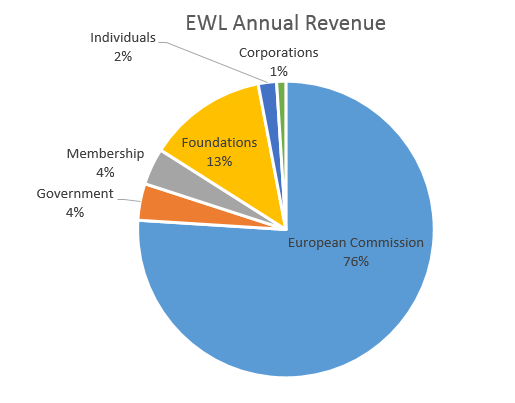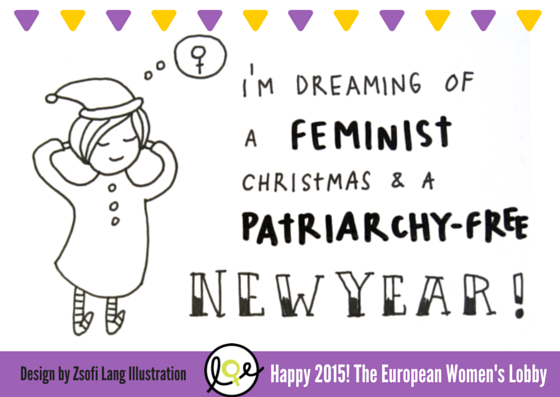[Brussels, 2 May 2014] 3 weeks before the European elections, the European Women’s Lobby explains, week after week, the demands of its Manifesto “Act now for her future, commit to gender equality!“. The sixth demand of the European Women’s Lobby (EWL), the largest umbrella organisation of women’s associations in the European Union, is a caring society.
Caring for others is central to the continuation of society. Caring for others, and being cared for, at different stages in our lives, is one of the central emotional experiences of our shared humanity. A caring society is a collective responsibility.
Care policies and the provision of care services are intrinsically related to the achievement of equality between women and men. The lack of affordable, accessible and high quality care services in most European Union countries and the fact that care work is not equally shared between women and men have a direct negative impact on women’s ability to participate in all aspects of social, economic, cultural and political life. The EWL calls all the Members of the European Parliament (MEPs) to work for the development of standards on high quality, accessible and affordable care services across the life-cycle, including reaching and reinforcing the Barcelona targets on child care and adopting new targets for the elderly and dependent persons.
Women are particularly at risk of experiencing inequalities in employment directly because of their caring activities. Caring activities impact on women’s participation in working life, career advancement, and the ability to work full-time, together with their ability for life-course integration into the labour market. Women have careers, jobs, professional responsibilities, and at the same time women continue to be in large part responsible for the care of their children, housework and care of dependents, whose numbers are increasing as the population ages. One way out of this “double life burden” for women lies firstly in changes in the gender division of work, leading to an equal sharing of caring tasks between women and men. Social and employment policies and the provision of services also have a very important part to play.
Women’s over-representation in care responsibilities – particularly unpaid – continues to be a major barrier to women’s access to the labour-market and affect women’s economic independence more so than men. In the majority of countries part-time work is equated with low pay, temporary contracts and increasingly precarious patterns of work, as well as limited career and training options. One third of the women who work part time or do not work at all say that this is because there are no child care services or they cannot afford them. Austerity measures that have curtailed public spending have had an impact in particular on child care provision in some Member States which have resulted in closing down facilities and making child care more expensive. In 2010, women spend 26 hours a week in unpaid work against nine hours for men. At this rate of ‘progress’, 40 years are required to reach gender parity in unpaid work!
Unpaid work is perhaps the biggest contribution that women make to the economy. Nevertheless, because it is unpaid, it has long been overlooked and undermined in economic equations and women’s contributions are left without recognition. The EWL demands the EU to work for equality in paid and unpaid work.
With regards to establishing real and sustainable gender equality there is urgent need to develop a multi-layered approach to enable both women and men to become equal earners and equal carers throughout their lives. The EWL calls on future EU policy-makers to prioritise care across the life-cycle by: introducing a holistic approach to care services which includes child care, multi-layered policies for elder and dependent persons’ care, which also includes investing in independent living policies. The barriers that prevent men’s equal participation in care responsibilities including their disproportional take-up rate on parental leave need to be addressed to make their equal participation socially accepted. The EWL calls on the new Commission to monitor the impact of the revised parental leave directive (2010) particularly on men’s take up rate.
Currently, many of the member states parental leave laws are applicable to the mother leaving the father’s participation mostly unaddressed. Therefore the EWL calls all the MEPs to move forward with EU level provisions on paternity leave, either in the context of Maternity Leave Directive under revision or as a stand-alone Directive.
The EWL points out that there are good examples of a more equal carer-equal earner system particularly in Sweden where parental leave is available to both women and men, which in turn deters employers from considering women a risky and expensive employee-pool and for men to consider parental leave as a career-threatening and financially risky undertaking. According to men in Sweden, the law has really helped them to better bond with their children.
The EWL also calls for consistency and coherence both between different pieces of legislation and between legal and policy tools, to ensure that, instead of contradicting and weakening each other, the different measures taken in different fields (care, flexicurity and working time in general, taxation, insurance, labour, poverty, demography and services of general interest) enhance the goal of promoting equality between women and men. This coherence is the only way to reach a caring society in a way that takes into account and furthers equality between women and men.
The EWL calls on the European Parliament, the European Commission to commit to real and effective equality between women and men, in all spheres of public and private life, across the EU.
Investing in gender equality to achieve a caring society will make her future a better world for us all.
Read here EWL Manifesto.
#EuropeanWomensVoice #EP2014
Women and girls are half of Europe’s population, and are entitled to the same rights as men and boys. Achieving substantive equality between women and men, promoting women’s rights and empowering women should be a priority of the European Union and its Member States. Gender equality is an essential part of democracy, social justice, human rights and dignity. Our Manifesto “Act now for her future, commit to gender equality!” develops our vision of a Europe committed to the realization of equality between women and men. We urge all candidates to the European elections to endorse it!



